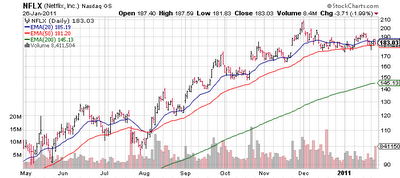The heavily shorted stock of Netflix (NFLX) is once more going to create some pain for the bears in the name, after a surge Wednesday evening in after hours following its earning report. While gross margins were pressured, and the churn rate increased, investors are overlooking any warts because of outperformance on net subscriber additions. For instance, this quarter the company actually had less gross profit($205M v $209M) than it had last quarter, despite revenue jumping $43M . When those type of things are ignored by the investor masses, that's what drives a short nuts. Marketing expense dropped by nearly $20M this quarter, which helped the EPS keep growing.
In terms of guidance, Netflix is pulling an interesting tactic in terms of going much more vague going forward. Usually this is seen as a red flag but for now the company is getting the benefit of the doubt. As the company surpasses 20M subscribers, it will be important to move into foreign countries not named Canada to keep up the growth rate, as the law of large(r) numbers will begin to kick in. As with all growth stories, eventually a wall will be hit - deceleration of growth momentum begins - and the stock takes a beating. Only then will valuation truly matter. But the shorts in this name have been making that bet for quite a few quarters, only to be kicked in the teeth.
The stock is indicating $206 in premarket, with $209s being the 52 week high. EPS came in at 87 cents versus 71 expectation; at this premarket level the stock will be trading at 60x-ish 2010 earnings. 2011 estimates are just under $4.00; assuming they can beat that significantly and do $4.50, this is still a premium 45x forward estimates.
- Netflix Inc.'s video subscription service topped 20 million customers during the fourth quarter to help push its earnings beyond analyst expectations and burnish its reputation as a stock-market star. Its shares surged 10 percent on the news. The shares tripled last year to give Netflix a market value of nearly $10 billion -- more than some of the studios that supply the content for its DVD-by-mail and Internet video streaming service.
- The lofty valuation has intensified the pressure on Netflix to keep attracting subscribers at a rapid pace. Netflix delivered in the fourth quarter by reeling in 3.1 million subscribers, by far the most during any three-month period since its service launched in 1999. The company, based in Los Gatos, said it believes the current quarter could be even better. It expects to gain as many as 3.7 million more subscribers in the U.S. and Canada by the end of March.
- In a departure from its past practice, Netflix didn't provide a full-year forecast, partly because executives say it's becoming more difficult to accurately forecast the company's rate of growth over such an extended period.
- Another variable clouding the outlook: Netflix unveiled plans to enter its second international market during the second half of this year after expanding into Canada last fall. The company didn't identify which new market it's targeting, but said it anticipates an operating loss of about $50 million on its international operations in the second half of the year. The Canada service is supposed to start making money during the third quarter.
- Netflix earned $47.1 million, or 87 cents per share, during the final three months of last year. That was a 52 percent increase from $30.9 million, or 56 cents per share, last year. Analysts surveyed by FactSet expected earnings of 71 cents per share.
- Revenue rose 34 percent to $596 million from $445 million a year earlier. That figure merely matched analyst estimates.
- For all of 2010, Netflix earned $161 million, or $2.96 per share, on revenue of $2.16 billion. That compared with net income of $116 million, or $1.98 per share, on revenue of $1.67 billion in 2009.
- Netflix spent $174 million on video streaming rights in the fourth quarter, a nearly eight-fold increase from $23 million at the same time in the prior year.
- It also raised its DVD prices and introduced an $8-per-month plan for U.S. subscribers who only want to stream Internet video. The company said about one-third of its new customers are signing up for the streaming only plan, with most others opting for a $10-a-month plan that includes one DVD rental at a time. Most existing subscribers are sticking with the plans they already had.
- As Netflix has prospered, it has turned into a bigger threat to cable TV services, particularly premium channels such as HBO and Showtime. HBO has steadfastly refused to sell its streaming rights to Netflix and Showtime isn't making as much material available as it once did.


No comments:
Post a Comment